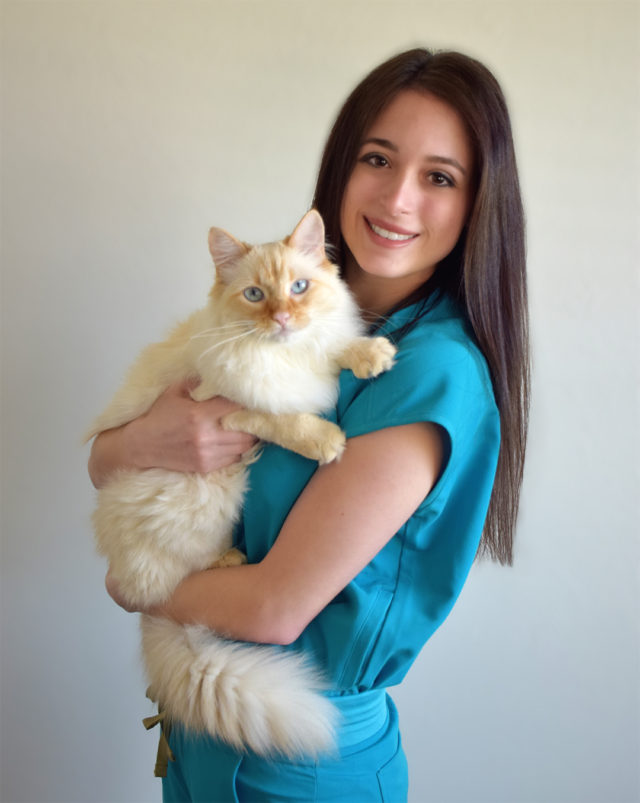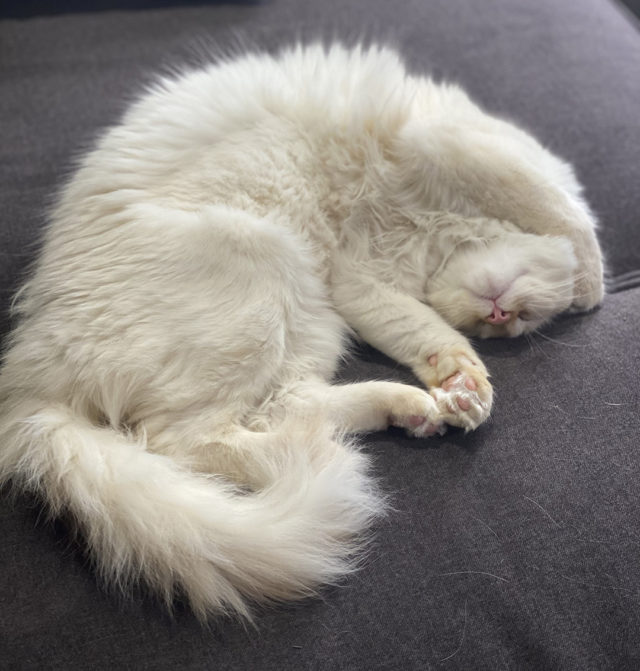Rescue Kitten With Rare Genital Dysplasia Condition Treated By, Finds Forever Home With Texas A&M Veterinary Student

When Lampasas Community Cats first brought Iroh, a Siamese-mix kitten, into the Texas A&M Veterinary Medical Teaching Hospital (VMTH), they were unsure of his fate. Based on his unusual condition, the non-profit organization didn’t know if anyone would be able to adopt him.
But thanks to Texas A&M’s Small Animal Hospital, Iroh was fixed up—literally—and found a forever home with the fourth-year veterinary student assigned to his case, Rachel Ellerd.
Ellerd met Iroh when he presented to the SAH Emergency & Critical Care Service (ECC) for suspected paraphimosis, or the inability to retract the penis.
Under closer examination, however, Iroh’s condition was much more unique. The anatomical position of his penis and testicles was inverted and no prepucial skin was covering his penis. He also did not present with a normal scrotum. It was determined that he likely had a rare condition called genital dysplasia, or penoscrotal transposition, possibly associated with a congenital XY chromosomal disorder that occurred during sexual development.
His specific condition is so rare that it is almost unheard of in veterinary literature, but, luckily, Dr. James Bilof, a clinical assistant professor at the Texas A&M College of Veterinary Medicine & Biomedical Sciences (CVMBS), had seen one similar case while working as a shelter veterinarian.
After Dr. Lance Wheeler, an ECC veterinary resident, determined that Iroh’s case, although unusual, did not need immediate correction, Ellerd reached out to Lampasas Community Cats as a potential foster.
“It was a match made in heaven,” Ellerd said. “I had been wanting to adopt a cat for some time. As soon as I saw Iroh, I knew he was the one—he just loved to be held and would not stop purring. He is a special-needs cat, and I knew that as a future veterinarian I’d have the knowledge to monitor his condition and guarantee proper care.”
Although Iroh had found a potential home, he was not in the clear yet. He spent weeks battling diarrhea and ringworm while being slowly brought up to an ideal size and weight so that surgery would be much more tolerable.
After months of fostering Iroh, Ellerd brought him back to the SAH to be neutered but was hit with frustrating news—a previously undetected liver condition would push back his surgery even further.

“I was devastated. I thought we were finally going to be able to fix him, but his pre-anesthetic bloodwork revealed a significant increase in ALT, an enzyme linked to liver disease in cats,” Ellerd said. “I was worried that he may have another congenital issue. We didn’t know what caused it but decided it was best to postpone his surgery until we could find out more.”
Iroh was placed on liver medications and a specialized diet, and at his recheck one month later, his liver values had improved.
Under the guidance of Bilof and clinical assistant professor Dr. Brad Bennett in the General Surgery Service, fourth-year veterinary student Eva Trevino performed Iroh’s surgery while Ellerd assisted the anesthesia team. Since Iroh was able to urinate well on his own, it was decided to leave his penis as it is and simply remove the testicles like a typical neuter.
“It was all such a fun memory and positive experience,” Trevino said. “The most unique neuter I’ll likely do in my whole career on a patient who’s just an absolute sweetheart.”
After the surgery was successfully completed, Ellerd was finally able to finish the adoption process from Lampasas Community Cats.
Iroh now lives comfortably at home and is “100% spoiled,” according to Ellerd.
###
For more information about the Texas A&M School of Veterinary Medicine & Biomedical Sciences, please visit our website at vetmed.tamu.edu or join us on Facebook, Instagram, and Twitter.
Contact Information: Jennifer Gauntt, Director of VMBS Communications, Texas A&M School of Veterinary Medicine & Biomedical Sciences, jgauntt@cvm.tamu.edu, 979-862-4216


